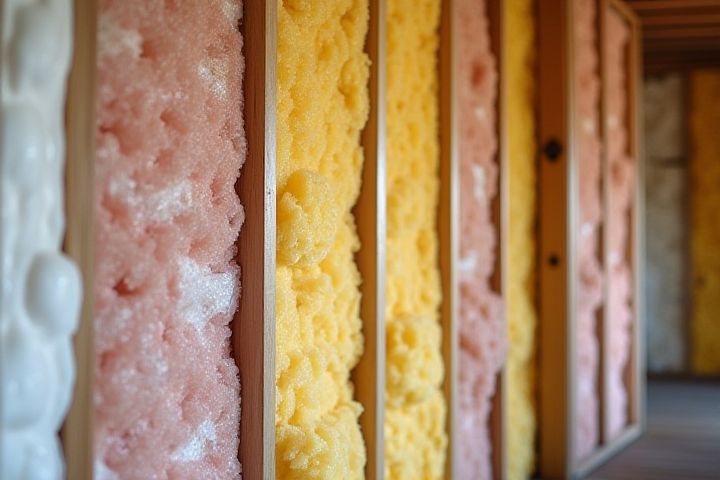
House insulation plays a crucial role in energy efficiency, maintaining a comfortable indoor temperature, and reducing energy costs. Proper insulation minimizes heat transfer, keeping your home warm in the winter and cool in the summer. This thermal barrier not only enhances comfort but also decreases reliance on heating and cooling systems, which can lead to significant savings on utility bills. Using materials like fiberglass, foam board, or spray foam ensures targeted insulation that can significantly reduce air leaks. By investing in quality insulation, you contribute to a more sustainable environment and improve the overall value of your property.
Why House Insulation Matters
Energy Efficiency
House insulation significantly enhances energy efficiency by reducing heat loss during winter and heat gain in summer. Proper insulation can decrease energy bills by up to 30%, as it minimizes the workload on heating and cooling systems. According to the U.S. Department of Energy, well-insulated homes can maintain a comfortable indoor temperature, requiring less energy consumption. By investing in insulation, you can create a more sustainable living environment while also contributing to lower greenhouse gas emissions.
Cost Savings
Investing in high-quality house insulation can lead to significant cost savings on your energy bills, often reducing them by 20% to 30%. Proper insulation maintains a consistent indoor temperature, decreasing the need for heating in winter and cooling in summer, ultimately lowering energy consumption. For an average homeowner, this could mean annual savings ranging from $200 to $400, depending on your climate and energy prices. Over time, the initial investment in insulation can pay for itself within a few years, making it a smart financial decision.
Environmental Impact
House insulation significantly reduces energy consumption, which directly lowers carbon emissions and mitigates climate change. With around 30% of heat lost through uninsulated walls and roofs, proper insulation can decrease energy bills by up to 20-30%. Improved insulation also minimizes the demand for fossil fuels, supporting a shift toward renewable energy sources. In the long term, choosing effective insulation materials contributes to a healthier ecosystem and decreases urban heat islands, benefitting both you and the environment.
Indoor Comfort
House insulation significantly enhances indoor comfort by regulating temperature and reducing drafts. Proper insulation can lower heating and cooling costs by up to 20%, making your home more energy-efficient. With an effective R-value, insulation minimizes heat transfer, keeping your living space warm during winter and cool in summer. Consequently, investing in high-quality insulation promotes a healthier environment, improving air quality and reducing noise pollution within your home.
Moisture Control
House insulation plays a crucial role in moisture control, significantly reducing the risk of mold and mildew development. Proper insulation creates a thermal barrier that maintains consistent indoor temperatures, minimizing condensation on walls and ceilings. When moisture levels are controlled, your indoor air quality improves, contributing to a healthier living environment. Investing in effective insulation can also prevent structural damage caused by prolonged exposure to dampness, extending the lifespan of your home.
Soundproofing
House insulation plays a crucial role in soundproofing, significantly reducing noise transmission between rooms and from outside sources. Effective insulation materials, such as fiberglass, foam, or cellulose, can decrease sound decibels by up to 30 dB, creating a more serene living environment. By ensuring your walls, floors, and ceilings are properly insulated, you can enhance your comfort and privacy, leading to improved quality of life. Investing in soundproofing insulation not only shields you from disruptive noises but also increases the overall value of your home.
Resale Value
House insulation significantly impacts your home's resale value, as it enhances energy efficiency and reduces utility costs, making your property more appealing to potential buyers. Homes with high-quality insulation often sell for 10% to 20% more than comparable properties lacking such features, translating into substantial financial returns. Upgrading insulation can pay for itself through lower heating and cooling bills, which can reach savings of up to 30%. Ultimately, a well-insulated home not only improves comfort but also serves as a smart investment in your future.
Temperature Regulation
House insulation plays a crucial role in temperature regulation, ensuring a comfortable indoor environment regardless of external weather conditions. By minimizing heat transfer, effective insulation helps maintain consistent temperatures, reducing the need for excessive heating in winter and cooling in summer. This energy efficiency not only lowers your utility bills but also contributes to a smaller carbon footprint, promoting environmental sustainability. Installing high-quality insulation materials can significantly enhance your home's overall energy performance and comfort levels.
Health Benefits
Proper house insulation significantly enhances indoor air quality, reducing allergens such as dust and mold that can lead to respiratory issues. Insulated homes maintain stable temperatures, minimizing the risk of hypothermia in winter and heat-related illnesses in summer. By preventing moisture accumulation, insulation also limits the growth of harmful bacteria, contributing to overall well-being. Investing in quality insulation can lower healthcare costs associated with preventable health problems, providing both physical comfort and financial benefits.
Reduced Heating and Cooling Needs
House insulation significantly reduces heating and cooling needs, leading to notable energy savings. With properly installed insulation, homeowners can decrease their heating costs by up to 30% during winter months and cooling expenses by as much as 20% in summer. This efficiency not only lowers monthly utility bills but also minimizes the wear and tear on HVAC systems, extending their lifespan. By maintaining a consistent indoor temperature, you enhance your comfort and reduce your carbon footprint, contributing to environmental sustainability.
